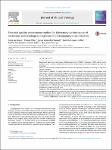External quality assessment studies for laboratory performance of molecular and serological diagnosis of Chikungunya virus infection
Jacobsen, Sonja
Patel, Pranav
Schmidt-Chanasit, Jonas
Leparc-Goffart, Isabelle
Teichmann, Anette
Zeller, Herve
Niedrig, Matthias
Background: Since the re-emergence of Chikungunya virus (CHIKV) in Reunion in 2005 and the recent outbreak in the Caribbean islands with an expansion to the Americas the CHIK diagnostic became very important. Objectives: We evaluate the performance of laboratories regarding molecular and serological diagnostic of CHIK worldwide. Study design: A panel of 12 samples for molecular and 13 samples for serology were provided to 60 laboratories in 40 countries for evaluating the sensitivity and specificity of molecular and serology testing. Results: The panel for molecular diagnostic testing was analysed by 56 laboratories returning 60 data sets of results whereas the 56 and 60 data sets were returned for IgG and IgM diagnostic from the participating laboratories. Twenty-three from 60 data sets performed optimal, 7 acceptable and 30 sets of results require improvement. From 50 data sets only one laboratory shows an optimal performance for IgM detection, followed by 9 data sets with acceptable and the rest need for improvement. From 46 IgG serology data sets 20 provide an optimal, 2 an acceptable and 24 require improvement performance. The evaluation of some of the diagnostic performances allows linking the quality of results to the in-house methods or commercial assays used. Conclusion: The external quality assurance for CHIK diagnostics provides a good overview on the laboratory performance regarding sensitivity and specificity for the molecular and serology diagnostic required for the quick and reliable analysis of suspected CHIK patients. Nearly half of the laboratories have to improve their diagnostic profile to achieve a better performance.
No license information

